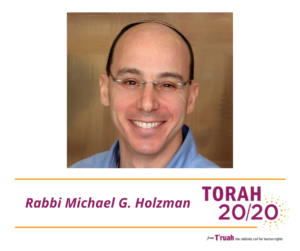When Isaac digs his own wells in this week’s parshah, he seeks sustainability, a policy approach to the future. The textual proximity to the birth of Jacob and Esau is no coincidence. Water, fertility, all of the anxieties of long-term survival are right there.
So when the Torah pits the two sons against each other, we see a story about how rivals compete not only for birthright and blessing, but more importantly for power. Both sides believe they know the right path forward and that the other is wrong.
This polarization is not inherently bad. If only, a few weeks ago, the Torah had provided Sarah’s dissenting viewpoint when God says to Abraham, “Take your son . . .”! That story demonstrates a world without competing ideas. So, this week, when we witness the first wells dug in the foundation of a new civilization, the Torah introduces some necessary viewpoint diversity: two parties competing for policy supremacy. Before our knees jerk against such friction, we ought to remember that opposing ideas, visions, and perspectives usually yield the most intelligent solutions.
Sign up to receive Torah 20/20 in your inbox each week.
But the Torah knows us too well. Human societies tend toward entropy not creative tension. So immediately we see Jacob and Rebecca team up against Esau and Isaac. And through all the machinations, what results? Extortion over a bowl of chow? Esau remains in Beersheva, leader of the family, and Jacob eventually turns over much of his wealth. Extracting the blessing with goat skins? In each of the following two parshiyot, Isaac’s blessing becomes superfluous as Jacob seeks additional blessings directly from God and angels. These are policy failures. Isaac’s wells don’t support even one generation through these tactics. When Jacob and Rebecca turn polarization into demonization, brokenness and the threat of violence (Gen 27:41-42) are the only results.
To emphasize the failure of this policy approach, the Torah gives us Laban, the schemer supreme. Again during a fertility story, a story about building for the next generation as Jacob seeks his love, Rachel, we witness fiasco. Demonization always backfires, the text seems to tell us.
So instead Jacob tries a different strategy. He obtains his own wealth and blessings (27:39-40) and eventually reconciles with Esau. And where these policy moves result in friction, Jacob does not demonize; he uses his power to negotiate peaceful separations with both Laban (31:51-54) and Esau (33:12-17).
If this cycle of family dramas illustrates the failure of demonization to establish sustainable policy, then why does our rabbinic tradition insist upon Esau’s evil nature? Even at the moment of rapprochement, when the brothers embrace in a kiss (33:4), one famous midrash proposes that the dots in the Torah scroll above the word “kiss” show Esau actually tried to bite Jacob, but God turned his teeth away.
Find more commentaries on Parshat Toldot
This is our struggle, as Jews and as citizens, with polarization. For every Hillel, willing to teach and learn his opponent’s point of view, there is a Shammai, who refuses (BT Eruvin 13b). Rabbis today love to teach the importance of majority rule in the Talmudic story of the Oven of Aknai, but do we continue reading to discover the way that the Jewish community expelled and ostracized the dissenting voice until “any place that Rabbi Eliezer fixed his gaze was burned” (BT Bava Metzia 59a-b)?
We too fall victim to demonization, reflecting or contributing to our dominant toxic political culture. How often do we shy away from tough political discourse fearing the vitriol that we assume will ensue? How many of us have banned politics from the Thanksgiving family gathering? How often do we sideline or work around those elements of our personal or communal ecosystems that we assume will oppose our agendas? How common are interfaith weddings, but how exceptional is an interpartisan one? Jacob and Rebecca’s bad habits infect our families, communities, institutions, municipalities, states and country. And to what end? Policy surely does not improve. Common sense solutions elude the partisans.
 Toldot teaches us to amass and use political power, but not seek to destroy, sideline or exclude political opponents. At this moment, our country needs healthy political habits as much as, or even more than, the right policy solutions. As we build a sustainable future, as we dig wells, polarization is inevitable, but demonization is preventable.
Toldot teaches us to amass and use political power, but not seek to destroy, sideline or exclude political opponents. At this moment, our country needs healthy political habits as much as, or even more than, the right policy solutions. As we build a sustainable future, as we dig wells, polarization is inevitable, but demonization is preventable.
Rabbi Michael G. Holzman is the spiritual leader of Northern Virginia Hebrew Congregation in Reston, VA, and the creator of the Rebuilding Democracy Project, winner of the 2019 Lippman Kanfer Prize for Applied Jewish Wisdom.

